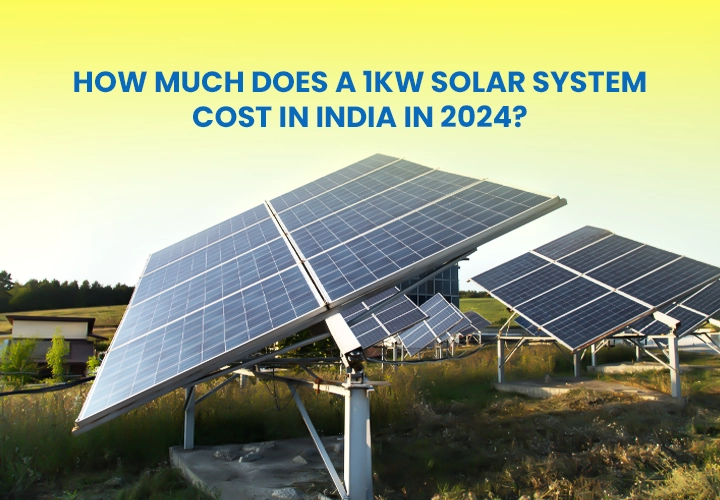How Much Does a 1kW Solar System Cost in India in 2024?

With rising electricity bills, more and more Indian households are shifting to solar energy, and the demand for green energy is increasing, too. Those looking for a cost-effective yet efficient solution will find the solar system increasingly popular, as it can cater to small houses’ energy needs. In this guide, we’ll break down the 1kW solar panel price in India, including key components and a detailed cost structure for home installations.
Introduction to Solar Energy
Solar energy converts sunlight into electric power using photovoltaic (PV) panels. It’s a well-known renewable green energy source that significantly reduces electricity bills and promotes a clean environment. Whenever available grid power is expensive, and one wants to be able to use as little power from the grid as possible, installing a solar power system one kilowatt in size or above will be a good option for such households.
Components of a 1kW Solar System
A qualified 1 kW solar system consists of the following elements:
Solar Panels: Panels are designed to capture sunlight and produce electricity. Generally speaking, three to four panels are used in a 1 kW unit.
Inverter: Necessary equipment that changes a direct current, which is produced by the Solar panels, into an alternating current supply that can be used in homes.
Battery: Off-grid systems utilise batteries to capture the excess electricity generated when there is no sunshine.
Support Structure: This supporting structure helps sustain the panels on the ground or roof for proper mounting.
Cables & Connections: To minimise losses, it’s critical to safely and properly wire these fittings to the panel energisers.
On-Grid vs. Off-Grid 1kW Solar Systems
A quintessential part of installing a solar panel at your home is deciding between different installation systems.
On-Grid Systems:
This is a system that’s connected to a local power system, and the electricity is imported from the grid at night or on days with low sunlight. Additional energy produced can also be returned to the grid, thus reducing the energy bill. As it does not require a battery, on-grid systems are usually cheaper and require very little maintenance. These systems operate effectively in cities where the grid is reliable.
Off-grid systems:
These are not connected to the grid; rather, they rely on batteries for storing energy. Off-grid systems allow for complete energy independence, which is perfect for areas that are remote and have no or poor access to grid electricity. On the negative side, such systems require higher capital input because they require batteries and more extensive maintenance.
For a detailed comparison, read about the difference between on-grid and off-grid solar systems.
Breakdown of a 1 kW Solar panel price in India
1 kW Solar system price can be determined based on geographical placement, the type of system, and the quality of the products. Here’s an estimated cost breakdown for 2024:
Solar Panels: from 20 Thousand to 30 Thousand INR
Inverter: From 8 Thousand to 12 Thousand INR
Battery (for Off-Grid Systems): From 15 Thousand to 20 Thousand INR
Mounting Structure: From 2000 to 5000 INR
Installation & Other Costs (varies by location) only from 5000 to 10000 INR
In this way, an average on-grid system will cost about 50 thousand to 75 thousand INR, while an off-grid system will be costly, ranging between 75 thousand to 90 thousand INR, owing to battery costs.
Why 1 kW Solar Systems offer better value than ever
India’s solar landscape has transformed dramatically in 2024. With increasing panel efficiency, government subsidies, and sharply reduced module prices, a 1 kW rooftop solar system now delivers unmatched value, even for smaller households. Many homeowners discover that the system pays for itself in reduced electricity bills in just 3–5 years, thanks to net metering and attractive feed‑in tariff rates across states. If you’re comparing alternatives, a 1 kW setup is often the sweet spot for long‑term savings without major upfront investment.
A 1 kW system not only saves money, but also improves one’s lifestyle. Imagine using clean, renewable energy to operate evening lighting, fans, and even a small refrigerator. The ROI is no longer a faraway dream; it is occurring right now. Smart monitoring enables real-time tracking of savings and carbon reduction.
Best Place to Buy a 1kW Solar System in India
The selection of a good solar company is important for quality products and assured service reliability. Known solar companies in India, like KCP Solar, therefore, have several features that make your journey with solar smoother. We offer:
High-Quality Products: Being one of the top solar companies, high-efficiency panels are delivered with a warranty of 10 to 25 years.
Installation & maintenance: We provide expert services that are significant for productive energy utilisation.
Subsidies & offers: Customers need to be informed about subsidised rates and offers by the government. As such, the 1 kW solar panel price in Tamil Nadu will receive approximately 30 thousand subsidy. We educate our patrons from time to time so that they can avail themselves of the best solar subsidies.
After-Sale Services: We provide hassle-free installation and ongoing maintenance services.
To learn about the cost of a 3kW system, read “3kW Solar Panel System Cost”
Conclusion
One of the best choices an Indian homeowner can make is to invest in 1 kW Solar Panels. However, the choice between an on-grid and an off-grid system will depend on the energy needs and location of the user. It will determine the 1 kW solar system cost that you have to spend. In such cases, where the powered area is primarily populated and has the possibility of a power grid, the prices of solar panels, like for 1 kW systems, will be lower compared to off-grid solutions. The former, however, will apply to areas that are mostly rural and remote without infrastructure.

